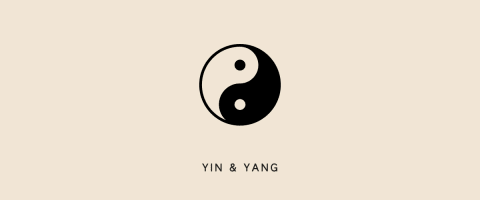Yin & Yang For Sleep: How This Ancient Philosophy Can Apply To Bedtime


It is estimated 100 million Americans (one-third of the population) are sleep-deprived and getting less than six hours of sleep per night. Poor sleep has been linked to many chronic illnesses1 such as diabetes, heart disease, obesity, dementia, and chronic pain.
Yin and yang is a main principle in the practice of Chinese medicine and it can be applied to all aspects of our life and health—including our sleep.
How do yin and yang relate to sleep?
"Yin" is associated with words like cool, soft, slow, dark, nighttime, feminine, deep, downward, and inward. It's tied to the element of water and the energy of the moon. "Yang" represents all things heat, speed, movement, light, daytime, masculine, upward, and outward. It relates to the element of fire and the energy of the sun.
It is important to note that it is yin and yang, not yin or yang. One can't exist without the other. There is always a bit of yin within the yang and yang within the yin, as represented by the recognizable TaiJi symbol (below). Yin and yang represent a dynamic balance of opposing but complementary life forces known as chi.

From the Chinese medicine perspective, sleep problems are caused by a yin and yang imbalance.
To understand this from a more Western scientific paradigm, we can look at yin and yang balance within the body as homeostasis. The sympathetic nervous system has more yang in nature, and the parasympathetic nervous system has more yin in nature. When these two forces are in balance, it's easier to fall asleep naturally and stay asleep throughout the night.
How to balance yin and yang for consistently better sleep.
Levels of yin and yang in our environment naturally vary throughout the day. In the morning, as the sun rises and we start to wake up, we enter into a more yang phase. The most yang time of day is 11 a.m. to 1 p.m., when there is maximum sunlight. Sunlight will pause the melatonin production that began the night before, and it will also spur the body to produce vitamin D, which helps with mood and metabolic functions. If we don't get restful sleep, it will manifest as us being tired and wired by this yang energy.
Following the movement and rhythm of day, in the evening the body will naturally move into a yin phase. The parasympathetic dominance that facilitates restorative sleep will kick in. The most yin time of day is 11 p.m. to 1 a.m. When the sun begins to set, melatonin is secreted, which signals the body to start slowing down and going to sleep.
The problem of modern life is that we tend to ignore and override the natural body's inclination for yin, for rest. This can result in racing thoughts when it is time to sleep, an example of yang energy when it is time for yin.
Being in rhythm with nature helps us be in the flow with our own internal clock and the body's ability to maintain homeostasis. For inspiration on how to do so, we can look to the seasons.
The most yang time of the year is summer, when people who tend to spend a lot of time in their own heads may find it difficult to get to bed. The warmth and sunlight make many people feel happier and have more energy, so there is the propensity to stay out later and get less sleep.
The most yin time of the year is winter, when the cooler weather and reduced light influence us to start the process of slowing down. Animals go into hibernation to conserve their energy during this time, and naturally we humans feel the need to rest and retreat as well.
The yin and yang of our bodies remind us that we are always in sync with the movement of the sun and moon, the transition of light and dark, the change in seasons, the cycle of life.
We can use this knowledge to promote better sleep by seeking steadiness within during seasonal changes. In winter, channeling yang by getting outside, exercising, and receiving acupuncture can offset some symptoms of seasonal affective disorder like depression. In summer, maintaining a consistent sleep schedule and keeping your bedroom cool and dark can help bring on the yin.
Like so many other things, better sleep is really all about balance.

Tsao-Lin, has over 18 years of experience as an expert in alternative and Chinese medicine. She is the founder of Integrative Healing Arts which utilizes Chinese medicine, acupuncture, herbal medicine and energy healing to treat patients, and the author of Will I Ever Get Pregnant, The Smart Woman's Guide to Get Pregnant Naturally Over 40.
She received her Masters of Oriental Medicine at Tri-State College of Acupuncture, and currently serves as a senior clinical faculty member there. Tsao is a NCCAOM (National Certification Commission for Acupuncture and Oriental Medicine) Diplomat in Acupuncture and Chinese herbal medicine. She has completed post graduate studies in classical Japanese herbal medicine known as Kampo and doctoral level training and certification in Sports Medicine Acupuncture®.
An experienced and highly trained licensed acupuncturist and healer, she serves patients in the New York City area and continues to study the ancient healing arts and the art of classical Chinese medicine. Much of her work focuses on teachings of master practitioner Kiiko Matsumoto.